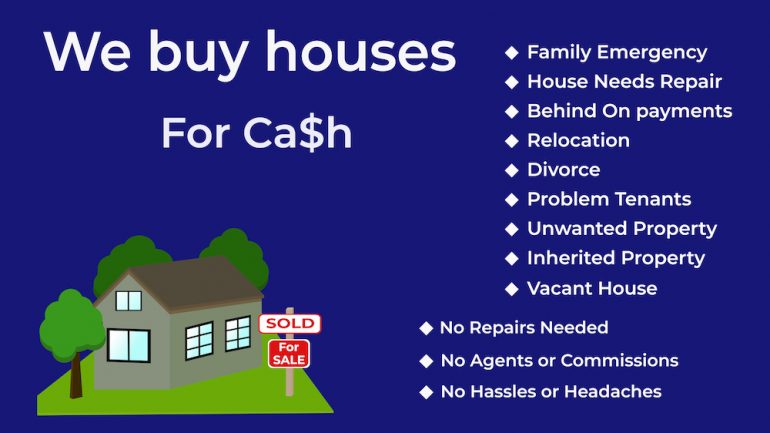While stopped at an intersection, you’ve probably seen signs advertising “we pay cash for houses.” You also may have heard radio ads for iBuyer companies, which will buy your home online. Both of these buyers offer sellers a quick sale, but are they legitimate? And how do they compare to each other?
“Cash for Houses” companies
“Cash for Houses” companies typically buy from distressed sellers. These are homeowners who are behind on their mortgage payments, going through a divorce or quick job transfer, or who can’t afford needed major repairs.
These companies pay cash, usually waive inspections, require no appraisal and often handle the closing and title work themselves. If you sell to them, you can close in as little as two weeks to a month and pay minimal closing costs. For a distressed seller, cash for house companies can seem like a lifeline out of a bad situation.
But cash for houses companies, which are investment property businesses, typically pay considerably less than market value for homes. At best, a seller may get 70 percent of market value. And the cash payout may be discounted by the estimated cost of any needed repairs. For example, if a home has a fair market value of $200,000, a cash for houses company might offer $140,000. If that same house needs significant repairs that the company estimates will cost $20,000, it will offer $120,000.
Companies such as We Buy Ugly Houses, Fast Home Offers, We Buy Houses and Express Home Buyers are legitimate cash for houses businesses. They have franchises across the nation, and when you call, you will be connected to the franchise owner in your area. If you are interested in selling to a cash for houses company, choose an established company like one of these.
Beware of cash for houses buyers with no company name, no logo and no website. Avoid cash buyers who charge up-front fees. Sometimes the buyer takes the fees but the sale never happens. Another pitfall to avoid is the “subject to” sale, in which the cash buyer pays you for the home and assumes your mortgage payments. Because the buyer in this type of arrangement is not legally obligated to pay off your mortgage, you are still on the hook and can lose the house if the buyer doesn’t make the payments. In most states, “subject to” deals are illegal.
There are also so-called “opportunity buyers,” who offer even less than other cash for houses buyers. With these buyers, the company representative will ask you what you owe on your mortgage and then offer you that amount and no more. Opportunity buyers are for only the most desperate distressed sellers.
iBuyers
In recent years, investment capital business groups have formed companies that purchase homes using computer algorithms to set a purchase price. Through the iBuyer’s website, the seller provides requested information and the company makes an initial offer online. The company fine-tunes its offer after a representative visits the home and determines the estimated cost of needed repairs.
An iBuyer will price a home closer to its fair market value than will a cash for houses company. But the iBuyer charges the seller a percentage of the purchase price comparable to what a real estate agent does and often an additional fee of 1.5 to 9 percent. So even though the sales price is closer to market, the seller receives less than they would in a more traditional sale.
Some of the bigger iBuyer companies include Opendoor, Zillow Offers, Offerpad, Knock and Orchard.
The traditional agency route
Even if you are in a “must sell” situation, don’t rule out working the traditional agency route without at least looking into it first. Through referrals, find an experienced agent who knows how to price and market a home to sell it quickly. You can definitely sell for more money the traditional way if your circumstances allow you to. Other alternatives include renting your home or entering into a lease-purchase agreement with a tenant-buyer.
Related – The Pros and Cons of “Instant Buying”


